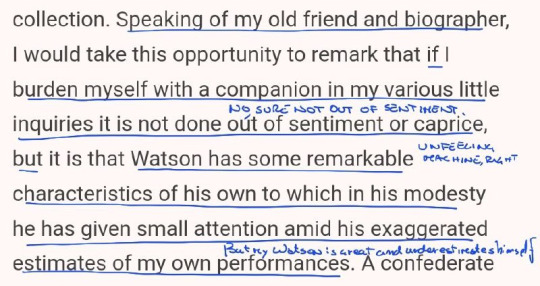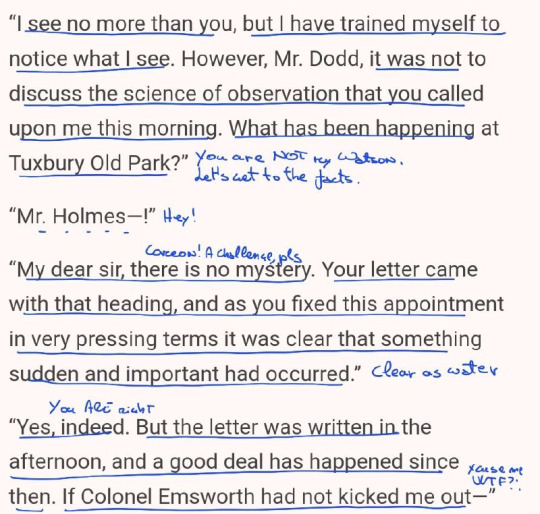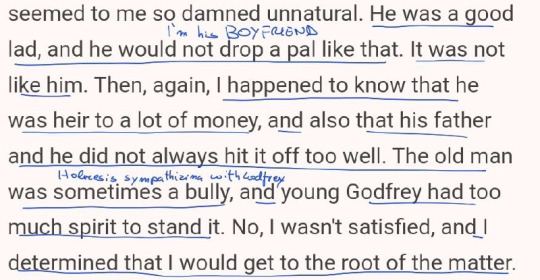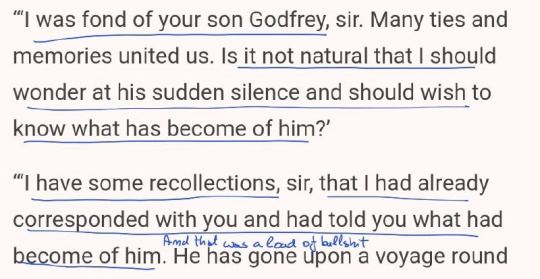#the blanched soldier
Text
The thing is, you read the stories written by Dr Watson and you think “this is the most down bad a narrator has ever been” and then you get to the stories written by Sherlock Holmes from his perspective and he’s somehow worse.
#the blanched soldier#sherlock holmes#acd canon#holmes x watson#john watson#letters from watson#holmes tag
1K notes
·
View notes
Text
Watson says all the time, Holmes is so emotionless, Holmes is a cold machine made of logic, but one of the only times a story is from Holmes' POV, he's all like they were DOOMED friends they LOVED each other but were TORN APART CRUELLY by fate and a really aggressive father ALSO I miss Watson SO BAD
306 notes
·
View notes
Text
Okay so... in The Blanched Soldier, Holmes calls Watson an 'ideal helpmate'.
'Ideal helpmate', at the time, was a synonym for spouse.
He is calling Watson his spouse.
#sherlock holmes#the casebook of sherlock holmes#the blanched soldier#sir arthur conan doyle#arthur conan doyle#conan doyle#acd#dr john watson#dr watson#john watson#classics#classical literature#classic books#classic novels#book#books#novel#novels#quote#quotes#ramble#rambles#thought#thoughts#lgbtq+#queer#gay
219 notes
·
View notes
Text

Put a knife through my heart, it would hurt less! 💔 😭
#letters from watson#sherlock holmes#john watson#acd canon#acd holmes#acd watson#the blanched soldier
150 notes
·
View notes
Text
So Holmes canonical keeps a diary! And while I'm sure it only contains the "hard facts" of his life - like where he went and whom he talked to and maybe his expenses if he didn't keep them separately, and of course his case notes - it is very tempting to think that he maybe also made notes about Watson. The book he looked at for a moment longer than usual so Holmes knows what to get him for Christmas, his preferred composers (probably not the same as Holmes's), maybe a thing he said that struck a chord with Holmes ...
#Holmes has a very good memory but he can't risk that he forgets which book Watson would like to read#just because Holmes is preoccupied with cases over cases or busy hyperfixating on bees or tobacco ash#pr maybe it eben says 'Dear diary today watson smiled at me' XD I dont know i haven't read it#sherlock holmes#dr watson#letters from watson#acd canon#the blanched soldier
115 notes
·
View notes
Text
Would you like to read the opening chapter of my monograph concerning the human ear? I am certain you will find it much more engaging. I believe I will begin thus:
It is sad to contemplate our lack of literature on ears—
FIAKFJAKFJKSJFD INCREDIBLE
84 notes
·
View notes
Text



Sherlock Holmes wants to infodump me so bad
78 notes
·
View notes
Text
Sherlock gets so grumpy when separated from Watson for any length of time. He’s like a pair-bonded shelter cat.
66 notes
·
View notes
Text
love how a good majority of people i've ever spoken to in this fandom agree that james and godfrey from BLAN are boyfriends-
like yeah, look at them, how could they not be.
32 notes
·
View notes
Text
There was not a finer lad in the regiment. We formed a friendship—the sort of friendship which can only be made when one lives the same life and shares the same joys and sorrows. He was my mate—and that means a good deal in the Army.
*whispering* Oh my god, they were mates
37 notes
·
View notes
Text
La aventura del soldado de la piel descolorida and translating love terms
After three letters from Sherlock Holmes, a cup two cups of tea and an alfajor I'm ready (?) to write about The Adventure of the Blanched Soldier, known in Spahish as La aventura del soldado de la piel descolorida (in my copy of Todo Sherlock Holmes) or La aventura del soldado de la piel decolorada.
One of the principal problems in translations is to translate one word into a group of another ones and choose the most accurate for each case. Love as a noun can be translated as it follows:
Amor: affection, romantic feelings, lover, affectionate term.
Enamoramiento: romantic feelings.
Querido, querida: dear, affectionate term.
Cariño: affection, affectionate term.
Pasión: strong liking.
Aprecio: regard, esteem
And as a verb:
Amar: feel affection for somebody, be fond of somebody, have romantic feelings for somebody.
Querer: feel affection for somebody.
Adorar: like strongly.
Apreciar: be fond of somebody.
The use changes according to times, dialects, gender, even personal experience. That's why every time I go to a store and a Venezuelan person calls me "mi amor" my cold southerner Chilean arse is screaming in panic because I don't use it at all, even with my pets.
Anyway _(:з)∠)_
In the first letter we had "You must put it down, sir, to my real love for your son." was translated as "Tiene usted que disculparme, señor. Cárguelo a cuenta del cariño que siento por su hijo". In this case there's no much difference because cariño is a word used for friends, family and lovers, so this can be interpretated in many ways. Later Dodd said "I was fond of your son Godfrey, sir." which can be translated as "Señor, yo apreciaba mucho a su hijo Godfrey." and still the sense of love is present.
However, in the same letter Holmes call Watson "an ideal helpmate", or "un ayudante ideal" in Spanish. Ayudante is used here as a helper, and it doesn't have the same strong feeling that helpmate that can be used for spouse. Helpmate has a degree of affection that ayudante doesn't have. Ayudante is more used in work or study context, and in my personal opinion it's too cold to use with somebody that has been at your side for so many years. Shame on you, Holmes in Spanish! ಠ_ಠ
This story has something, that little spiciness between James and Godfrey, and in the constants laments of Holmes missing Watson that even translating love as cariño or aprecio you can feel something intense is happening here. To finish this I quote Jesús Ulceroy's comments of this story and the role of Watson in Holmes' work as a detective:
Si sabemos leer entre líneas, nos damos cuenta de que la torpeza de Watson es una figuración, un fingimiento. Un ardid que permite al ambiente relajarse y que agudiza los sentidos analíticos del detective. Pese a todo, Holmes nos vuelve a dar su bofetada al declarar resuelto el caso mucho antes del final del mismo: un final seco y feliz. Un final explicativo. Y un ardiente deseo finamente expresado para que Watson vuelva. ¡Ah, el amor, sus egoísmos!
Translating into English is:
If we know how to read between the lines, we realize that Watson's clumsiness is a figuration, a pretence. A trick that allows the environment to relax and that sharpens the detective's analytical senses. Despite everything, Holmes slaps us again by declaring the case solved long before its end: a dry and happy ending. An explanatory ending. And a finely expressed burning wish for Watson to return. Ah, the love, the selfishness of it!

#sherlock holmes#letters from watson#acd canon#the blanched soldier#BLAN#lost in translation#jesús ulceroy#todo sherlock holmes#letters in the underground
33 notes
·
View notes
Text
HELLO HUMANS! Well, well, a new letter from our dear W-AIT WHAT?

W-what? Holmes is WRITING?? DAAAMN.
Watson messing with carpentry and beating his fingers instead of the nails... well, he just got the WRONG nails. Luckily Holmes is taking care of him! And agreed to write to us!
Ah Holmes, no need to be so bitter about it! Or maybe you are teasing you husband, uh? And yes. You tormented him with criticism and this is the payback. Write your own story and then take your own steps to apologize to Watson. Talking of him.

Watson, reading this: I am an unfeeling, rational and non-sentimental machine, so i'll present you an entire paragraph on how much i love my husband
Holmes, blushing crimson: Shut up you insufferable tease
W: Just admit that you love me
H: I did it thrice in the first 10 minutes after we woke up this morning
-snuggling watson noises- Now read on.

W: A WIFE, HOLMES? She was a PATIENT. She was having difficulties with the last stretch of her pregnancy and i had to go at hers!
Also i love how Holmes describes his way of analyzing his clients. And also how he goes 'so, Watson likes it when i do my deductions, it impresses Watson, and also other people, so i'll deduce this man's last years of life'
And at his surprise the reaction is

I miss my Watson so please give me the fact and hope this case is challenging as your letter made hope...
WAIT, WHAT? KICKED YOU OUT? TELL ME MORE! -puffing on his pipe-

Stop being cheeky, lad. Tell the FACTS.
And he does. He was in South Africa and there he met a guy and they bonded a lot and he was wounded and now he disappeared!

Holmes is in this moment sympathizing with young Godfrey, he's interested!
Story continues. Our guy here manages to get himself invited to their place, a quite inaccessible one and gets shown into the father's study. the interview is not pleasing.

The man tells him to go the hell away and leave them alone since he ALREADY EXPLAINED, our pal says that his 'explanations' are a big load of bullshit. Man tells him to stay for dinner. Atmosphere is DEPRESSING and he climbs to his room as soon as decent and then the butler drops in!
Butler is like super old and his wife nursed Godfrey and so he asks if his foster kid behaved well in war and then he starts talking weird... in past tense as if he was dead. OF COURSE OUR PAL ASKS

THAT'S ONE HELL OF AN ANSWER, DAMNIT!
W: Ah, so now i'm matters, Holmes. Nice cliffhanger
H: -grumble grumble- Writing this stuff is difficult. I'll propose them the ear monograph!
W: at least it's not the tobacco one...
H: Which you read...
-bickering goes on-
Our Holmes left us with a cliffhanger just like his husband does! We'll hear the continuation in the next letter!
#letters from watson#today from holmes!#the blanched soldier#holmes is writing!#sherlock holmes#dr watson#he's a DOCTOR not a CARPENTER!#And right now he's 'matters to attend to'#victorian husbands
37 notes
·
View notes
Text
So, this part of The Blanched Soldier:

I have two theories as to what could have happened and what the butler meant. (I'm a first time reader of all ACD Holmes so I'll find out if I'm accurate later!)
First theory: Godfrey has ended up in an institution (maybe from PTSD after fighting in the war?) but everyone is hushing up about it because of the attitudes about mental health at the time.
Second theory: Godfrey ended up committing a crime and his "tour around the world" is actually him being on the run from the law.
#Letters from Watson#BLAN#The Blanched Soldier#ACD Holmes#ACD canon#speculation#don't spoil me I want to see for myself
24 notes
·
View notes
Text
The Boer War (1899-1902)
If the 1897 Diamond Jubilee is seen as the zenith of the British Empire, the Boer War is arguably the start of its collapse.
There are two conflicts with the name "Boer War", of which the second is by far the better known.
"Boer" is Afrikaans for farmer. The two wars are known as "the Freedom Wars" in the Afrikaans language and "the South African War" in the country itself.
More specifically, the Boers were Dutch farmers who emigrated from the Dutch and then British-controlled Cape Colony north and east into the Transvaal region that is now north-east South Africa, to get away from what they saw as an oppressive government. As well as the fact that the British abolished slavery, which they wanted to keep. So yeah. They were more specifically known as "Trekboers" or travelling farmers. Trek is of course where we get the term Star Trek from.
The first conflict from 1880-1881 started after a farmer refused to pay an illegally inflated tax, had his wagon seized - and his friends then assaulted the auction.
The Boers, better equipped, better trained and far more experienced at shooting than their British opponents, managed to defeat the latter in three major engagements. Unwilling to become engaged in a major conflict, London negotiated a peace deal that gave the South African Republic effectively full control over internal affairs, although the British retained control of external relations. This was the first time the British had lost a war to rebels since the American War of Independence.
Then gold was found in the region and an influx of immigrants, mostly British, turned up, seeking their fortune. Johannesburg emerged as a major community overnight. This caused a lot of tensions, even more so when the government in Praetoria (the SAR capital) denied the 'uitlanders' civil rights.
In 1896, Cape Colony Prime Minister Cecil Rhodes authorised Leander Starr Jameson to conduct a raid into the territory with the aim of triggering a revolution. The raid was badly botched, failed and caused massive embarrassment to the British government, especially when Kaiser Wilhelm II sent a congratulatory telegram to the SAR government... and telegrams showing Rhodes' involvement were found. Jameson, while lionised in the press, spent 15 months in Holloway for the raid.
Shortly after this, the Second Matabele War saw the British have to deal with an uprising by the Ndebele and Shona peoples in what is now Zimbabwe. They defeated it, but with many losses on both sides.
Tensions between the British and the Boers continued to grow after the Jameson Raid; the uitlanders did not see their rights improve, the Boers mistreated the African population, and a lot of the British establishment thought it would be an easy victory. The generals, for their part, did not.
The SAR had acquired high quality weaponry from Germany and France, including bolt-action Mauser rifles. The British Army for its part was in dire need of reform.
The war broke out in 1899 after an ultimatum from SAR leader Paul Kruger for the British to withdraw their forces from the border. The SAR had allied with the Orange Free State by this point.
The Boers had formed civilian militias called "commandos". They launched an invasion of the Natal and Cape Colony, soon putting British garrisons under siege. One notable such siege was at Mafeking, where the British commander was one Robert Baden-Powell, whose use of scouting, along the deception to make his defences look better than they were allowed his force to hold out for 217 days until relieved. He would later use his experience in scouting to form, well, the Scouting Movement.
After a series of major reverses, it was clear the British were going to need to send major reinforcements, recruiting a lot of volunteers - the biggest overseas force Britain had sent to date. They also removed their local commanders and put new ones in.
The sieges were lifted and Praetoria was captured on 5 June 1900 - at which point the Boers (along with foreign volunteers) moved to guerilla warfare, something that they were very adept at, in stark contrast to the British. However, harassment is not the same as taking and holding ground.
Both forces tried to minimise the involvement of people of colour due to fear of what would happen if they armed Africans, but personnel shortages meant they ended up being involved anyway, usually in supporting roles. Mahatma Gandhi, who was a civil rights activist there, formed a corps of volunteer stretcher bearers from the Indian population.
Realising that they were only controlling the territory that they were physically in, the British changed their tactics.
Firstly, they built fortified blockhouses and armoured trains to control their supply routes.
Secondly, the British adopted a "scorched earth" policy; they rounded up Boer and African civilians, placing them in concentration camps, while also systematically destroying farms, crops etc. that the Boer forces could use to supply themselves.
The Spanish had used concentration camps in Cuba earlier in the 19th century, but this was a much wider use. With little or no soap, along with dirty water, disease swept through the overcrowded camps, with over 46,000 dying in them, including a quarter of the Boers in them - African numbers interned were not properly counted. Emily Hobhouse exposed the horrific conditions, and the matter was taken up by domestic politicians. A government commission led by Millicent Fawcett then recommended major improvements, which were largely implemented and brought down the death rate, but the damage had been done by this point.
The brutal tactics were sadly effective; the Boers were beginning to give up. However, the British themselves were running out of time and money, so gave them a generous settlement in the 1902 Treaty of Vereeniging; while the SAR and Orange Free State would be absorbed into the British Empire, Dutch could be used in schools and courts, there would be a general amnesty and reconstruction aid would be given.
Self-government was also promised and granted; it was decided that the issue of black enfranchisement would not be discussed until then - and full enfranchisement would not come until 1993.
The war was controversial in the UK; it was opposed by the opposition Liberal Party. Lord Salisbury called a snap election in 1900 and won with a slightly reduced majority. The next election in 1906 was a massive defeat for them though.
The conflict also exposed the dire state of British public health - with up to 40% of volunteers for the war being rejected on health grounds. This spurred the creation of the National Insurance system.
Arthur Conan Doyle volunteered for military service in the conflict; but was turned down due to his age. Instead, he served for three months in a field hospital and then wrote two books about the conflict. The second one, defending Britain's involvement in the war, was felt by Doyle to be the work that got him his knighthood in 1902.
The war was also notable for one journalist who after being captured by the South Africans, managed to escape from behind enemy lines, using the publicity to get into Parliament on his second attempt. His name was Winston Churchill.
At 2022 values, the war cost Britain over £19.9 billion.
They had also had 26,092 soldiers killed to the Boers 6,189. As with all wars at this time, disease was the biggest killer.
#letters from watson#sherlock holmes#history#factoids#the boer war#the blanched soldier#blan#acd canon
26 notes
·
View notes
Text
And here it is that I miss my Watson. By cunning questions and ejaculations of wonder he could elevate my simple art, which is but systematized common sense, into a prodigy.
HOLMES. He has done it again. This reminds me so much of the beginning of the story where he writes:
The good Watson had at that time deserted me for a wife, the only selfish action which I can recall in our association. I was alone.
In both cases, the longer sentence could technically be read as criticism (or a compliment!) or irony, thus taking away some if the rawness of "I was alone" and "And here it is that I miss my Watson".
But. But then Holmes says "my Watson" (an expression he uses often!) which is so clearly indicating that they still belong together, Watson may be married but he's still Holmes's Watson, at least in Holmes's thoughts ... And although he has brought his strange new doctor friend, he could not replace his Watson or even only his unique skill set.
This is often a feature of the cases, but I also think it's weird how abruptly the story is over. Clearly, for Holmes it's Case Closed - end of narrative. But the thing that strikes me is that we don't learn anything about Dodd's reaction. Won't he be overjoyed to learn he will be reunited with his friend? (No, because there is no reunion between Holmes and Watson.) And why is there no real conclusion, only the suggestion that the symptoms might be psychosomatic?
But is it coincidence? Are there not subtle forces at work of which we know little? Are we assured that the apprehension from which this young man has no doubt suffered terribly since his exposure to its contagion may not produce a physical effect which simulates that which it fears?
This case openly suggests a psychological explanation, and sorry, I can't stop think about the Holmes/Watson mirror (Emsworth was shot in the shoulder), and how Watson is married and how Holmes is alone ... And society keeps them apart, because no matter whether they were in any kind of romantic or sexual relationship, for two bachelors to live together for so long must have been a bit suspicious (and let's not forget the "combination of events, into which I need not enter,").
This story's leitmotif is the search for a lost friend, and the whole last paragraph seems to me to speak of how internalised prejudice makes you sick. We never see the social outcast who was shunned by society because of a alleged "disease" actually return to a regular life. We don't know if it will be possible. Holmes will certainly go home alone.
Oh, I really wonder what Watson thought when he read all that.
#i know i know i know everyone has screamed about this already but i also need make my own scream XD#also 'ejaculations of wonder' hehehe yes I'm very mature#sherlock holmes#letters from watson#dr watson#the blanched soldier
93 notes
·
View notes
Text
Mr. James M. Dodd appeared to be the sort of person whom it would be better to have as a friend than as an enemy. His blue eyes were stern and his square jaw had set hard as he spoke.
Holmes, trying to remember Watson’s knack for bisexually effusive descriptions: He had…uh….blue eyes…and square jaw.
132 notes
·
View notes